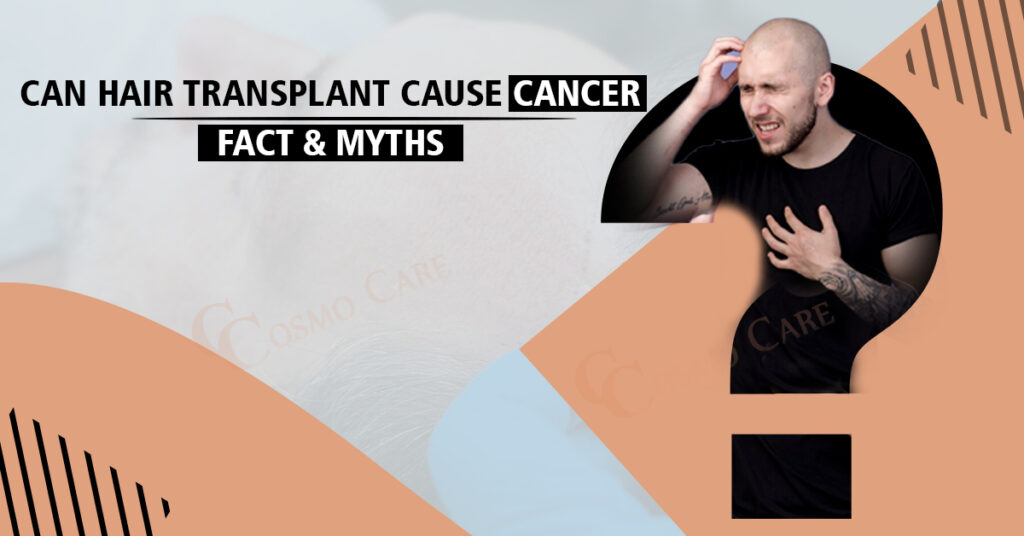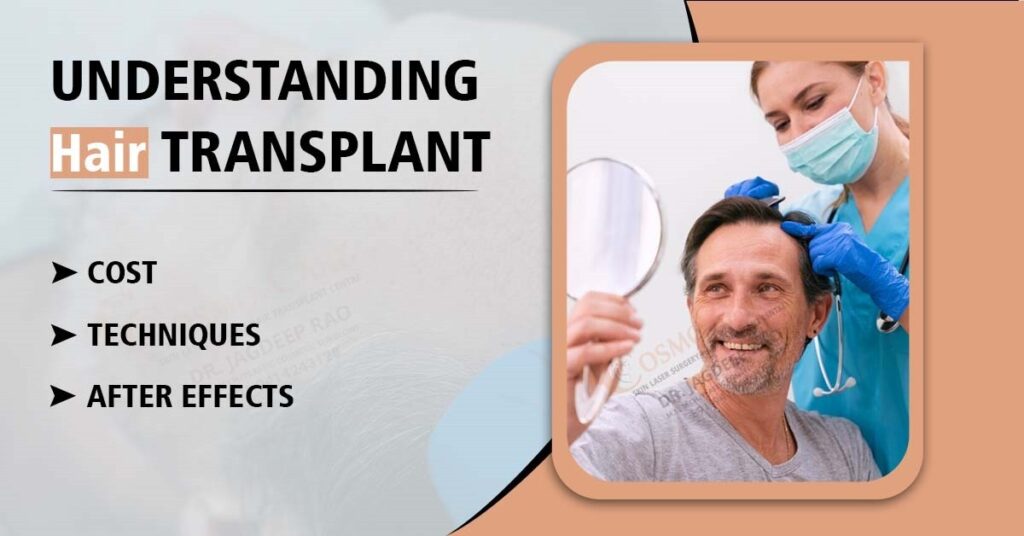Overview
Hair transplants have emerged as a transformative solution in the modern hair restoration industry, addressing the widespread issue of hair loss with remarkable effectiveness. This innovative procedure, which involves relocating hair follicles from one part of the body to the balding or thinning areas, has gained significant traction due to its natural-looking results and long-lasting benefits.
As technology advances and techniques become more refined, the demand for hair transplants has soared, marking a significant shift in both consumer attitudes and industry practices. Furthermore, the widespread acceptance and success of hair transplants have debunked numerous myths, such as the notion that the results are unnatural or that the procedure is prohibitively expensive. Today, hair transplants are recognized not only for their aesthetic advantages but also for their ability to boost confidence and improve quality of life.
Do Hair Transplants Cause Cancer?
The idea that hair transplants cause cancer is a myth. Here’s a scientific perspective to justify this. Hair transplants are surgical procedures where hair follicles are moved from one part of the body (donor site) to a bald or balding part (recipient site). The two primary methods are Follicular Unit Transplantation (FUT) and Follicular Unit Extraction (FUE).
Scientific Evidence
- No Carcinogenic Mechanism: Hair transplants involve the relocation of hair follicles and do not introduce any carcinogenic (cancer-causing) substances into the body. The procedure does not involve the use of chemicals or radiation known to increase cancer risk.
- Cellular Behavior: The hair follicles themselves are normal, healthy cells from the patient’s own body. They are not modified in a way that would cause them to become cancerous. The transplantation process does not alter the genetic material of these cells.
- Clinical Studies: There is no clinical evidence or documented case studies that link hair transplant procedures to the development of cancer. Medical literature and research do not support any connection between hair transplants and an increased risk of cancer.
- Expert Opinions: Dermatologists and plastic surgeons, who perform these procedures, widely agree that hair transplants are safe. The American Academy of Dermatology and other professional organizations do not list cancer as a risk associated with hair transplants.
While hair transplants are generally safe, they do carry some risks, which are common to many surgical procedures:
- Infection
- Scarring
- Poor hair growth
- Folliculitis (inflammation of hair follicles)
- Temporary hair thinning (shock loss)
Hair transplants do not cause cancer. The myth likely arises from a general fear of surgical procedures and a misunderstanding of how they work. Based on current scientific understanding and clinical evidence, hair transplants are considered a safe option for addressing hair loss.
Side Effects Of Hair Transplant?
Hair transplants are generally considered safe, but like any surgical procedure, they come with potential side effects. Here are some common and less common side effects associated with hair transplants:
Common Side Effects
- Pain and Discomfort: Mild pain and discomfort in the donor and recipient areas are common and can be managed with pain medication prescribed by the surgeon.
- Swelling: Swelling of the scalp, forehead, and around the eyes can occur, usually lasting for a few days post-surgery.
- Bleeding: Minor bleeding at the transplant sites is common immediately after the procedure.
- Infection: Although rare, infections can occur at the transplant site. Antibiotics are usually prescribed to prevent this.
- Itching: Itching in the donor and recipient areas is common as the scalp heals. This can usually be managed with medication or gentle washing.
- Shock Loss: Temporary thinning or shedding of transplanted hair, known as shock loss, can occur but typically regrows within a few months.
- Numbness: Temporary numbness or lack of sensation in the scalp is common and usually resolves within a few weeks to months.
Other Side Effects
- Scarring: Linear scarring can occur in FUT (Follicular Unit Transplantation) procedures. In FUE (Follicular Unit Extraction), tiny circular scars may occur but are less noticeable.
- Cysts: Small cysts can form in the recipient area where follicles are implanted. These usually disappear on their own or can be treated easily.
- Hiccups: Some patients experience hiccups after the procedure, although the cause is not well understood. This side effect is usually temporary.
- Folliculitis: Inflammation or infection of hair follicles, causing redness and pustules, can occur. It is typically treated with antibiotics or anti-inflammatory medications.
- Keloid Scarring: In some individuals, particularly those prone to keloids, excessive scar tissue can form at the donor or recipient site.
You can read also:- Understanding Hair Transplant – Cost, Techniques & After Effects
Can Cancer Patients Get A Hair Transplant?
Cancer patients can get hair transplants, but there are several factors to consider before undergoing the procedure. Here’s a detailed look at the considerations and potential challenges:
Considerations for Cancer Patients
● Type and Stage of Cancer:
- Active Cancer: Hair transplant is generally not recommended for patients with active cancer or those undergoing active treatment like chemotherapy or radiation therapy. These treatments can affect the scalp and hair follicles, potentially compromising the success of the transplant.
- Remission: Patients in remission or those who have completed cancer treatment may be considered for hair transplants. A thorough evaluation by both the oncologist and the hair transplant surgeon is necessary.
● Overall Health:
- Immune System: Cancer treatments can weaken the immune system, making it harder for the body to heal from surgical procedures. A strong immune system is crucial for recovery and minimizing the risk of infection.
- General Health: The patient’s overall health and medical history should be assessed to ensure they are fit for surgery.
● Scalp Condition:
- Radiation Therapy: If the scalp has been exposed to radiation, the skin and underlying tissues may be damaged, affecting the viability of hair follicles and the success of the transplant.
- Chemotherapy: Chemotherapy can cause temporary hair loss, but the scalp usually recovers after treatment. It’s important to wait until the hair and scalp are healthy before considering a transplant.
Timing of the Procedure
- Post-Treatment Waiting Period: It is often recommended to wait at least 6-12 months after completing cancer treatment before undergoing a hair transplant. This allows time for the body to recover and for any potential side effects of treatment to subside.
Psychological Considerations
- Self-Esteem and Quality of Life: Hair loss due to cancer treatment can significantly impact a patient’s self-esteem and quality of life. For some patients, restoring hair through a transplant can be a positive step in their emotional and psychological recovery.
Consultation with Specialists
- Oncologist: The patient’s oncologist should be consulted to ensure that there are no medical contraindications to undergoing a hair transplant.
- Hair Transplant Surgeon: A qualified hair transplant surgeon should evaluate the patient’s scalp condition, overall health, and suitability for the procedure.
While hair transplants are a potential option for cancer patients, they should only be considered after careful evaluation and consultation with medical professionals. The patient’s overall health, the type and stage of cancer, and the condition of the scalp are all critical factors in determining the feasibility and timing of the procedure.
Why Choose Cosmo Care for Hair Transplant Surgery?
In conclusion, hair transplant surgery is a viable solution for individuals seeking to restore their hair and regain confidence. With advancements in techniques such as FUE and FUT, patients can achieve natural-looking results with minimal scarring and downtime. Choosing Cosmo Care for your hair transplant surgery ensures you benefit from the expertise of qualified surgeons, state-of-the-art technology, and a patient-centric approach. Cosmo Care’s commitment to personalized treatment plans, comprehensive care, and competitive pricing makes it a top choice for those looking to address hair loss effectively and safely. With a proven track record of successful outcomes and satisfied patients, Cosmo Care stands out as a trusted provider in the field of hair restoration.



